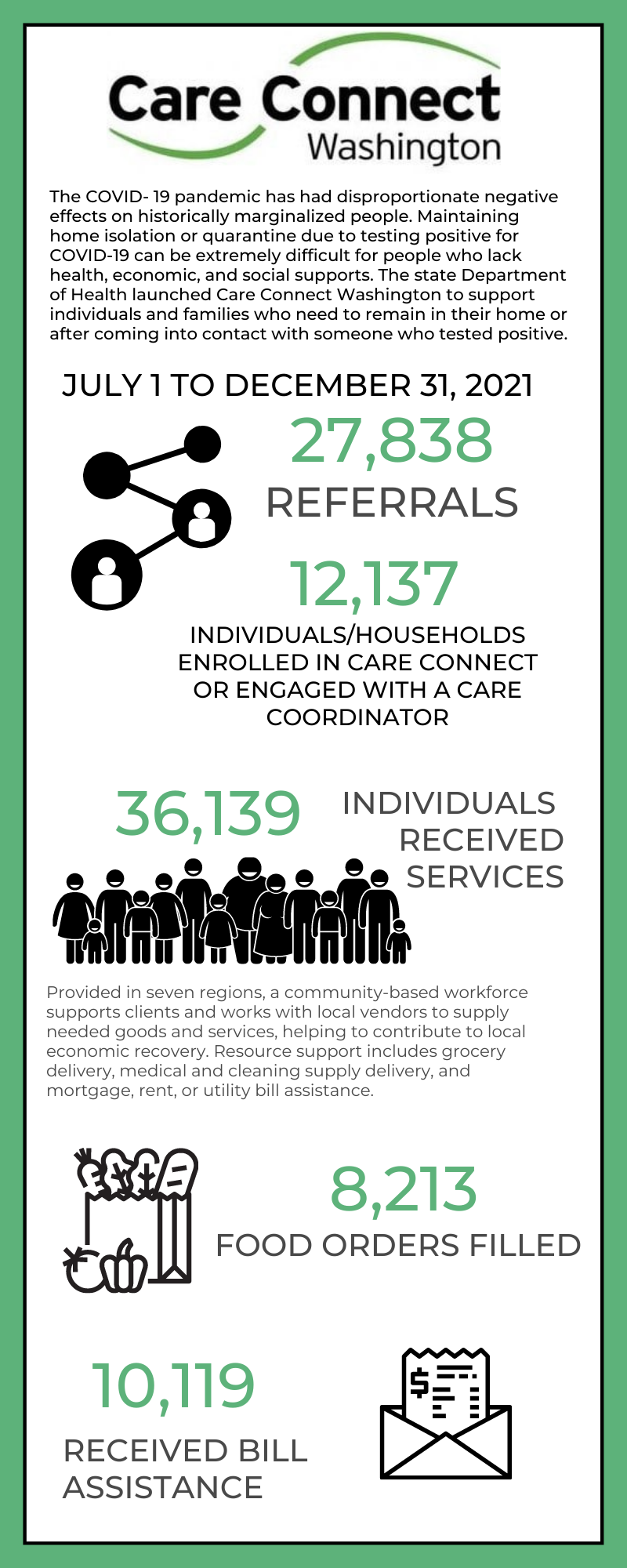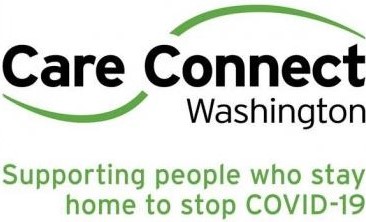The state Department of Health (DOH) launched Care Connect Washington to support individuals and families who need to remain in home isolation or quarantine due to testing positive for COVID-19, or coming into contact with someone who tested positive—at no cost to the client. Isolation or quarantine (I&Q) are important tools used to avoid spreading COVID-19 to our neighbors, friends, family, and coworkers—and to lessen its broad-reaching negative effects on our communities.
Some households have the means and ability to isolate or quarantine with little or no support. However, the COVID- 19 pandemic has had disproportionate negative effects on historically marginalized people. Maintaining home I&Q can be extremely difficult for people who lack health, economic, and social supports. And, when home I&Q ends, people may return to a profoundly affected economic and social reality with the same lack of supports that put them at risk in the first place.
Care Connect Washington combines state-supported infrastructure and regional care coordination partnerships with a locally managed, community-based workforce. By using a low-barrier, human-centered model to identify and provide supports, Care Connect Washington increases successful compliance with home I&Q, addresses health and social needs, reduces transmission, and reduces the health, economic, and social impacts COVID-19 has on communities.
DOH manages the care coordination response, supports hiring and training, bridges statewide and local resources, and optimizes outcomes by managing pooled resources, such as funding and technical infrastructure. Each region identifies and deploys a community-based workforce that supports clients, connecting them to local resources to support successful I&Q. The regions work with local vendors to supply needed goods and services, helping to contribute to local economic recovery. Resource support includes grocery delivery, medical and cleaning supply delivery, and mortgage, rent, or utility bill assistance. When isolation or quarantine ends, care coordinators can connect clients to longer-term support for ongoing health and social needs. As of December 29, 2021 Care Coordinators in seven regions across the state have supported 64,309 individual/household members.
Care Connect Washington assembles a rich set of interconnected assets: a statewide resource referral system, technology to support a shared community health record, a braided network of state and local resources to help meet client needs, and a trusted community-based workforce. These assets have enormous value beyond COVID: they are the core of a new community public health infrastructure that could be deployed in response to other crises or in support of key public health priorities, such as chronic disease, behavioral health, maternal and child health, WIC, and childhood immunizations, for many years to come. The creation of the Care Connect Washington system has opened the possibilities for a new way to address our most critical and longstanding health care challenges.
Long term vision is for sustainability of the Care Connect System – to support ongoing care coordination across regions and be ready for future emergency needs. The goal is for an integrated public health utility system that supports intersectional solutions to complex community health challenges – that investments made to build a statewide system because of the pandemic continue to have value and benefit to regions across the state.
Currently we are working to implement Care Connect Washington services in the North Central Region (Chelan, Douglas, Grant and Okanogan counties) with the support of a new grant from CDC – Community Health Workers for COVID Response and Resilient Communities. This grant not only supports the supports and services provided by Care Connect WA but also will support training and the development of new or expansion of existing Community Health Worker coalitions and engagement opportunities. This includes:
- Collaborate with community-wide efforts to ensure comprehensive acquisition of relevant knowledge, roles, and skills by CHW/Ps are in place so they are prepared to successfully engage with existing state and/or local public health-led actions to manage COVID-19 among priority populations within their communities.
- Appropriate training opportunities to disseminate messaging for CHW/P focused on reaching those with underlying conditions and/or environments that increase the risk and severity of COVID-19 infections among priority populations.
- Align training opportunities for CHW/Ps & CCs with the primary actions of state and/or local public health led efforts to address the underlying conditions and/or environments that increase the risk and severity of COVID-19 infections among priority populations within communities
- Coordinate and promote opportunities, such as messaging/education within communities and clinical settings to facilitate the engagement of CHWs to address the needs of priority populations.
- Facilitate engagement of CHWs in the care, support, and follow-up across clinical and community settings of priority populations at highest risk for poor health outcomes including those impacted by COVID-19.
Starting mid-January 2022 Care Connect Washington services will be available in Clallam County. The Clallam County Department of Health and Human Services will be serving as the Care Coordination Agency and providing care coordination services to individuals and households in home isolation and quarantine.


